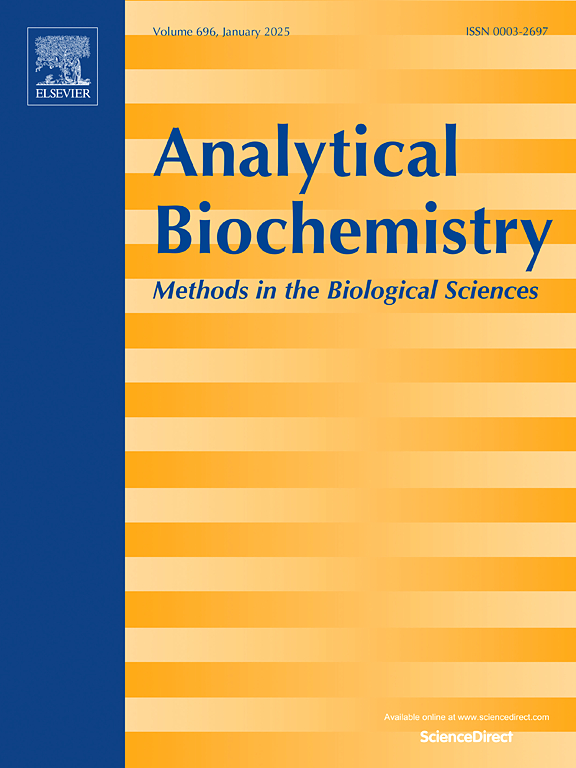A nucleic acid-based strategy for highly specific discrimination between mutant and wild-type sequences
IF 2.5
4区 生物学
Q2 BIOCHEMICAL RESEARCH METHODS
引用次数: 0
Abstract
This study presents a novel Terminal Self-Competitive Nucleic Acid Probe (TSCP) for rapid, precise detection of mutant and wild-type gene sequences. The TSCP probe employs overlapping binding domains and inhibition strands, enabling highly specific competitive hybridization. Combined with hybridization chain reaction (HCR) for signal amplification, the method achieves nanomolar sensitivity without requiring proteases, temperature control, or complex instrumentation. Experimental validation in blood samples demonstrated distinct fluorescent signals for mutant and wild-type sequences, allowing accurate target differentiation. The probe is cost-effective and scalable, as it only requires nucleic acid synthesis for new mutations, ensuring rapid adaptation to emerging variants. This straightforward, versatile approach facilitates simultaneous detection of genetic variations, making it highly suitable for molecular diagnostics and genetic research. Its high specificity, rapid response, and low-cost production underscore its potential as a practical tool for advancing mutation detection in clinical and research settings. By eliminating the need for specialized equipment and enabling quick deployment, the TSCP-based method offers a widely accessible solution for identifying genetic mutations, enhancing both diagnostic accuracy and research efficiency.

基于核酸的突变型和野生型序列高度特异性区分策略。
本研究提出了一种新型的末端自竞争核酸探针(TSCP),用于快速、精确地检测突变型和野生型基因序列。TSCP探针采用重叠结合域和抑制链,实现高度特异性的竞争性杂交。结合杂交链反应(HCR)的信号放大,该方法达到纳摩尔灵敏度,不需要蛋白酶,温度控制,或复杂的仪器。血液样本的实验验证表明突变型和野生型序列的荧光信号不同,允许准确的目标分化。该探针具有成本效益和可扩展性,因为它只需要为新的突变合成核酸,确保快速适应新出现的变异。这种简单,通用的方法有助于同时检测遗传变异,使其非常适合分子诊断和遗传研究。它的高特异性、快速反应和低成本生产强调了它作为在临床和研究环境中推进突变检测的实用工具的潜力。通过消除对专用设备的需求和实现快速部署,基于tscp的方法为识别基因突变提供了一种广泛可用的解决方案,提高了诊断准确性和研究效率。
本文章由计算机程序翻译,如有差异,请以英文原文为准。
求助全文
约1分钟内获得全文
求助全文
来源期刊

Analytical biochemistry
生物-分析化学
CiteScore
5.70
自引率
0.00%
发文量
283
审稿时长
44 days
期刊介绍:
The journal''s title Analytical Biochemistry: Methods in the Biological Sciences declares its broad scope: methods for the basic biological sciences that include biochemistry, molecular genetics, cell biology, proteomics, immunology, bioinformatics and wherever the frontiers of research take the field.
The emphasis is on methods from the strictly analytical to the more preparative that would include novel approaches to protein purification as well as improvements in cell and organ culture. The actual techniques are equally inclusive ranging from aptamers to zymology.
The journal has been particularly active in:
-Analytical techniques for biological molecules-
Aptamer selection and utilization-
Biosensors-
Chromatography-
Cloning, sequencing and mutagenesis-
Electrochemical methods-
Electrophoresis-
Enzyme characterization methods-
Immunological approaches-
Mass spectrometry of proteins and nucleic acids-
Metabolomics-
Nano level techniques-
Optical spectroscopy in all its forms.
The journal is reluctant to include most drug and strictly clinical studies as there are more suitable publication platforms for these types of papers.
 求助内容:
求助内容: 应助结果提醒方式:
应助结果提醒方式:


